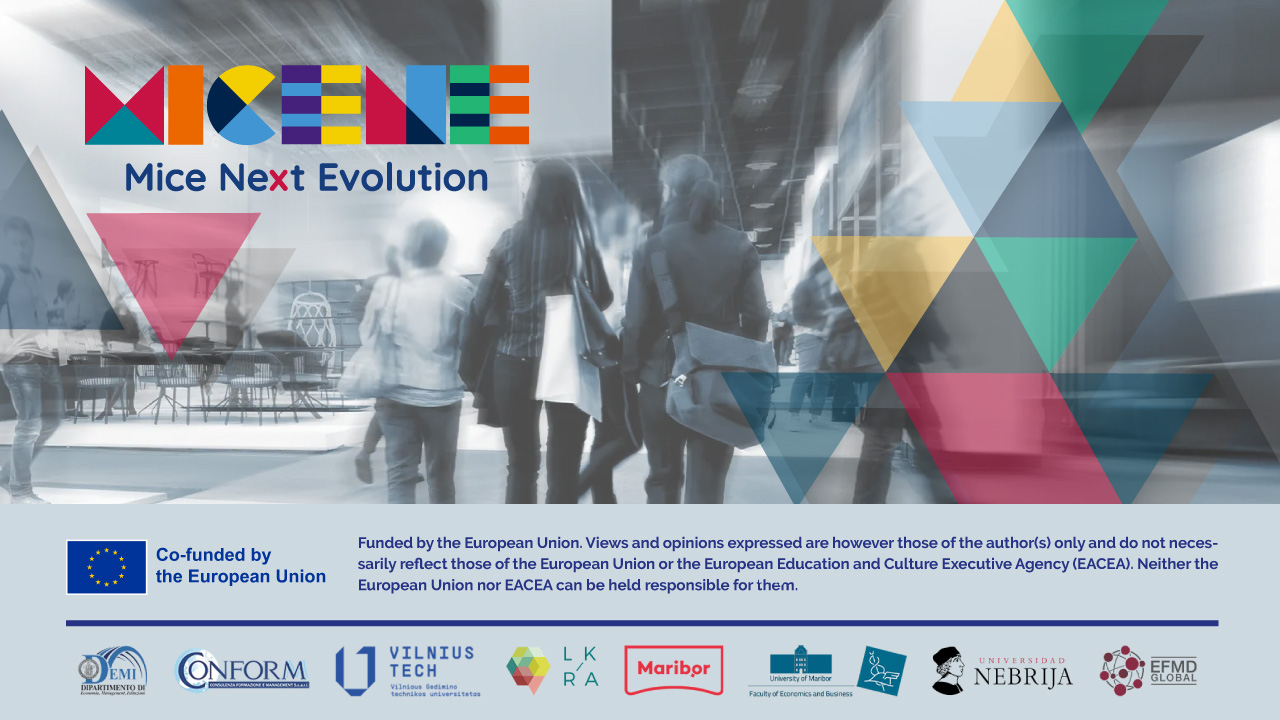About the course
The MICENE - Mice Next Evolution defines and shares objectives, methods, and tools for a model of transnational cooperation between HEIs and actors in the MICE sector from IT, ES, BE, LT, and SI, aiming to establish a stable partnership to design, develop, test, and promote a new HE Curriculum in MICE Management. This curriculum seeks to enhance, among young European students from economic backgrounds, an integrated set of managerial, digital, and green skills, empowering them to become genuine change agents in the MICE sector through this blended course.
This blended course consists of the 16 modules covering key topics within the MICE sector, including:
- An overview of the MICE Ecosystem
- Identification of organisational structures
- Market definitions and analysis
- International and EU regulations and policy making
- Strategic planning and development
- Design and operational management
- Human resources and career development
- Mice marketing and communication
- Event interactions
- Supply chain management and logistics
- Budgeting and financial management
- Entrepreneurship and innovation
- Technology development and emerging business opportunities
- Sustainability and ethics
- Project management and inter-collaborative partnerships
- Feedback Management and process Redesign
8 of them are in the form of microlearning containing a multitude of interactive materials.
These OERs are complemented by two narrative branching scenarios that allow viewers to test their behavioural abilities and their knowledge of the learning contents of the OER, interacting with the simulation of a real business context. Viewers are given three possible options to choose who they would behave in that circumstance.
Curious? Register for the course and see if you have what it takes to become a successful MICE manager.
Course content
Enrolment options
MICE.N.E. - Mice Next Evolution
The MICENE - Mice Next Evolution defines and shares objectives, methods, and tools for a model of transnational cooperation between HEIs and actors in the MICE sector from IT, ES, BE, LT, and SI, aiming to establish a stable partnership to design, develop, test, and promote a new HE Curriculum in MICE Management. This curriculum seeks to enhance, among young European students from economic backgrounds, an integrated set of managerial, digital, and green skills, empowering them to become genuine change agents in the MICE sector through this blended course.
This blended course consists of the 16 modules covering key topics within the MICE sector, including:
- An overview of the MICE Ecosystem
- Identification of organisational structures
- Market definitions and analysis
- International and EU regulations and policy making
- Strategic planning and development
- Design and operational management
- Human resources and career development
- Mice marketing and communication
- Event interactions
- Supply chain management and logistics
- Budgeting and financial management
- Entrepreneurship and innovation
- Technology development and emerging business opportunities
- Sustainability and ethics
- Project management and inter-collaborative partnerships
- Feedback Management and process Redesign
8 of them are in the form of microlearning containing a multitude of interactive materials.
These OERs are complemented by two narrative branching scenarios that allow viewers to test their behavioural abilities and their knowledge of the learning contents of the OER, interacting with the simulation of a real business context. Viewers are given three possible options to choose who they would behave in that circumstance.
Curious? Register for the course and see if you have what it takes to become a successful MICE manager.
- Non-editing teacher: Jolanta Beniuliene
- Non-editing teacher: Laima Jeseviciute-Ufartiene
- Non-editing teacher: Zivile Jezerske
- Non-editing teacher: RENATA KORSAKIENE
- Non-editing teacher: Agenzia.Nazionale Micene
- Non-editing teacher: Sandra Monroy Rodríguez
- Non-editing teacher: Javier Navarro
- Non-editing teacher: Igor Perko
- Enrolled students: 78


